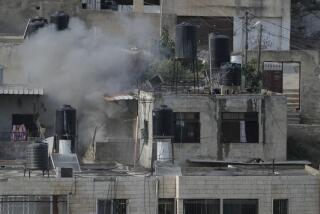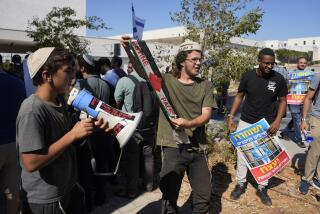Violent army crackdown on Cairo protesters shocks Egyptians
- Share via
Reporting from Cairo — Morning broke on a scene that wasn’t supposed to be in the new Egypt: burned military trucks, skeins of barbed wire, blood in the dirt, one protester dead.
In a predawn raid Saturday that stunned the nation, Egyptian soldiers stormed Tahrir Square to disperse about 2,000 protesters angry at the ruling military council for failing to deliver democracy and bring corrupt officials to justice after the ouster of President Hosni Mubarak.
The capital’s central square, a scene of celebration two months ago when Mubarak fell from power, became a surprise battlefield as soldiers beat protesters and tore down tents. One demonstrator was shot dead and 71 others were injured. The military said its troops fired only blanks, but protesters said the air was peppered with live ammunition.
The city echoed with sustained gunfire as soldiers swept into the crowd shortly after 3 a.m. Many protesters were dragged toward trucks, and hundreds of others scattered as troops closed ranks and demonstrators hurled stones. Tensions were further heightened as protesters formed a line to protect at least eight junior military officers who had switched sides and joined the demonstrations hours earlier.
“We are starting to realize that unfortunately the military is our enemy,” said Mohamed Wagdy, a protester and unemployed engineer who witnessed the raid. “They were an integral part of Mubarak’s regime, and now their mask has fallen off. Now we can’t say that the army and the people are one hand anymore.”
In a news conference, Gen. Adel Omara said the army cleared the square after demonstrators refused repeated warnings to obey a 2 a.m. curfew. The confrontation, he said, lasted until 5 a.m. but skirmishes erupted again at 5:30 a.m. when “counterrevolutionaries” carrying two rifles and Molotov cocktails arrived. Omara said the death of a protester was reported around this time. Arab media reported that two protesters were killed.
Omara said the military was investigating whether the soldiers who had stood with the protesters were imposters in stolen uniforms. The army has grown increasingly sensitive about dissension in its ranks after soldiers have appeared on YouTube videos denouncing the military leadership.
The unrest was the culmination of weeks of gnawing disenchantment under army rule. The once-revered military was credited with intervening Feb. 11 to help protesters end Mubarak’s 30-year rule. But that euphoria has given way to suspicion among many Egyptians who blame the army for not quickly installing democracy and for failing to bring Mubarak and his corrupt inner circle to justice.
Demonstrators say the ideals of the revolution have been abandoned by a military council led by Field Marshal Mohammed Hussein Tantawi, who brims with swagger and holds sway over a weak transitional government. The military has scheduled parliamentary elections and has arrested a number of former ministers in Mubarak’s Cabinet, but it is not a democratic institution and it is straining to balance its authority with the demands of the people.
The gap between these dynamics has widened in the course of the struggle to build a new country amid the vestiges of the former ruling party and generals who for three decades kept Mubarak, a former air force commander, in power. What the army views as order, including military tribunals to try dissidents, much of the population sees as violations against free speech and human rights.
By Saturday evening, thousands of Egyptians had flowed into Tahrir. Protesters set up barbed-wire barricades to keep soldiers out.
“We are not going to leave Tahrir Square now,” said Yasser Atef, sitting near a burned army truck. “We wanted Mubarak put on trial. Now, we want Tantawi on trial. What happened in this square overnight cannot pass until those responsible are punished.”
Atef and other protesters said that shortly after 2:30 a.m. soldiers and Interior Ministry police had approached them. Some demonstrators had taken positions on the roads leading into the square to look out for pro-Mubarak thugs who have attacked protesters across the capital in recent weeks.
“We were talking with the soldiers and police and telling them that this is a peaceful sit-in,” said Abdullah Masoud, a 28-year-old electrician. “But at 3:20 a.m., we were surprised when they returned to attack us, beating us and firing gunshots randomly.... They kept firing at us and beating us until around 6 a.m.”
Wagdy, the unemployed engineer, gave a similar account: “Protesters were running in every direction and we had many women and children and families who were trying to escape the scene. The soldiers tried to surround protesters, but we kept on running back and forth in order not to lose our ground in the square.”
Omara said the military would again use “firmness and force” to clear demonstrators from the square after curfew.
Chants of protesters filled Tahrir much of the day: “Tantawi is the same as Mubarak! Egyptians, come out of your homes!”
Hassan is a news assistant in the Times’ Cairo bureau.
More to Read
Sign up for Essential California
The most important California stories and recommendations in your inbox every morning.
You may occasionally receive promotional content from the Los Angeles Times.











